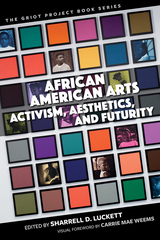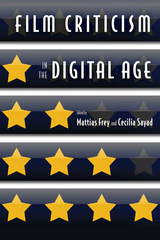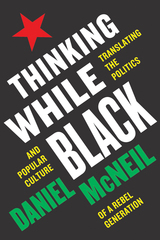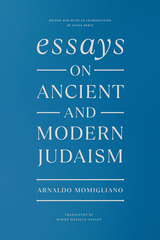3 books about McNeil, Daniel

African American Arts
Activism, Aesthetics, and Futurity
weems, carrie mae
Bucknell University Press, 2020
Signaling such recent activist and aesthetic concepts in the work of Kara Walker, Childish Gambino, BLM, Janelle Monáe, and Kendrick Lamar, and marking the exit of the Obama Administration and the opening of the National Museum of African American History and Culture, this anthology explores the role of African American arts in shaping the future, and further informing new directions we might take in honoring and protecting the success of African Americans in the U.S. The essays in African American Arts: Activism, Aesthetics, and Futurity engage readers in critical conversations by activists, scholars, and artists reflecting on national and transnational legacies of African American activism as an element of artistic practice, particularly as they concern artistic expression and race relations, and the intersections of creative processes with economic, sociological, and psychological inequalities. Scholars from the fields of communication, theater, queer studies, media studies, performance studies, dance, visual arts, and fashion design, to name a few, collectively ask: What are the connections between African American arts, the work of social justice, and creative processes? If we conceive the arts as critical to the legacy of Black activism in the United States, how can we use that construct to inform our understanding of the complicated intersections of African American activism and aesthetics? How might we as scholars and creative thinkers further employ the arts to envision and shape a verdant society?
Contributors: Carrie Mae Weems, Carmen Gillespie, Rikki Byrd, Amber Lauren Johnson, Doria E. Charlson, Florencia V. Cornet, Daniel McNeil, Lucy Caplan, Genevieve Hyacinthe, Sammantha McCalla, Nettrice R. Gaskins, Abby Dobson, J. Michael Kinsey, Shondrika Moss-Bouldin, Julie B. Johnson, Sharrell D. Luckett, Jasmine Eileen Coles, Tawnya Pettiford-Wates, Rickerby Hinds.
Published by Bucknell University Press. Distributed worldwide by Rutgers University Press.
Contributors: Carrie Mae Weems, Carmen Gillespie, Rikki Byrd, Amber Lauren Johnson, Doria E. Charlson, Florencia V. Cornet, Daniel McNeil, Lucy Caplan, Genevieve Hyacinthe, Sammantha McCalla, Nettrice R. Gaskins, Abby Dobson, J. Michael Kinsey, Shondrika Moss-Bouldin, Julie B. Johnson, Sharrell D. Luckett, Jasmine Eileen Coles, Tawnya Pettiford-Wates, Rickerby Hinds.
Published by Bucknell University Press. Distributed worldwide by Rutgers University Press.
[more]

Film Criticism in the Digital Age
Frey, Mattias
Rutgers University Press, 2015
Over the past decade, as digital media has expanded and print outlets have declined, pundits have bemoaned a “crisis of criticism” and mourned the “death of the critic.” Now that well-paying jobs in film criticism have largely evaporated, while blogs, message boards, and social media have given new meaning to the saying that “everyone’s a critic,” urgent questions have emerged about the status and purpose of film criticism in the twenty-first century.
In Film Criticism in the Digital Age, ten scholars from across the globe come together to consider whether we are witnessing the extinction of serious film criticism or seeing the start of its rebirth in a new form. Drawing from a wide variety of case studies and methodological perspectives, the book’s contributors find many signs of the film critic’s declining clout, but they also locate surprising examples of how critics—whether moonlighting bloggers or salaried writers—have been able to intervene in current popular discourse about arts and culture.
In addition to collecting a plethora of scholarly perspectives, Film Criticism in the Digital Age includes statements from key bloggers and print critics, like Armond White and Nick James. Neither an uncritical celebration of digital culture nor a jeremiad against it, this anthology offers a comprehensive look at the challenges and possibilities that the Internet brings to the evaluation, promotion, and explanation of artistic works.
[more]

Thinking While Black
Translating the Politics and Popular Culture of a Rebel Generation
Daniel McNeil
Rutgers University Press, 2023
Thinking While Black brings together the work and ideas of the most notorious film critic in America, one of the most influential intellectuals in the United Kingdom, and a political and cultural generation that consumed images of rebellion and revolution around the world as young Black teenagers in the late 1960s. Drawing on hidden and little known archives of resistance and resilience, it sheds new light on the politics and poetics of young people who came together, often outside of conventional politics, to rock against racism in the 1970s and early ‘80s. It re-examines debates in the 1980s and ‘90s about artists who “spread out” to mount aggressive challenges to a straight, white, middle-class world, and entertainers who “sold out” to build their global brands with performances that attacked the Black poor, rejected public displays of introspection, and expressed unambiguous misogyny and homophobia. Finally, it thinks with and through the work of writers who have been celebrated and condemned as eminent intellectuals and curmudgeonly contrarians in the twenty-first century. In doing so, it delivers the smartest and most nuanced investigation into thinkers such as Paul Gilroy and Armond White as they have evolved from “young soul rebels” to “middle-aged mavericks” and “grumpy old men,” lamented the debasement and deskilling of Black film and music in a digital age, railed against the discourteous discourse and groupthink of screenies and Internet Hordes, and sought to stimulate some deeper and fresher thinking about racism, nationalism, multiculturalism, political correctness and social media.
Listen along with this Spotify playlist inspired by the book!
For copyright reasons, this book is available in the U.S.A only.
Listen along with this Spotify playlist inspired by the book!
For copyright reasons, this book is available in the U.S.A only.
[more]
READERS
Browse our collection.
PUBLISHERS
See BiblioVault's publisher services.
STUDENT SERVICES
Files for college accessibility offices.
UChicago Accessibility Resources
home | accessibility | search | about | contact us
BiblioVault ® 2001 - 2024
The University of Chicago Press









